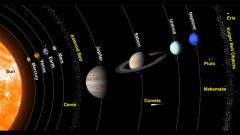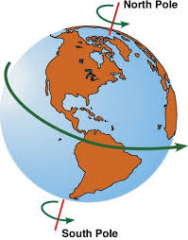![]()
![]()
![]()
Use LEFT and RIGHT arrow keys to navigate between flashcards;
Use UP and DOWN arrow keys to flip the card;
H to show hint;
A reads text to speech;
8 Cards in this Set
- Front
- Back
|
Solar System
|

the collection of eight planets and their moons in orbit around the sun, together with smaller bodies in the form of asteroids, meteoroids and comets. |
|
|
Outer Planet
|
The four outermost planets in our solar system ;located outside the asteroid belt ;Jupiter, Saturn, Uranus, Neptune; also known as gas giants, they are larger than the inner planets and are spaced far very apart. |
|
|
Inner Planet
|
the four innermost planets in our solar system; located inside of the asteroid belt; Mercury, Venus, Earth, Mars; also known as the terrestrial planets, they are smaller in size, made of rock and metal, spaced closer together.
|
|
|
Rotaton
|

the action of rotating around an axis or center; the main movement of objects within our solar system; one rotation = one day on a planet. |
|
|
Revolution
|
the act of moving a circle around another object; one of the main movement of objects within our solar system; all planets and objects within our solar system revolve around our Sun; one revolution= one year on a planet. |
|
|
Orbit |
the curved path of a celestial object or spacecraft around a star, planet or moon
|
|
|
Gravity |
the force that attracts a body toward the center of the earth, or toward any other physical body having mass' the governing force in our solar system; all planets are held together by the gravity of the sun' more mass= more gravity. |
|
|
Inertia. |
A property of matter by which it resists changes in its motion; objects at rest tend to stay at rest while an object in motion tends to stay in motion unless acted upon by an outside force; another governing force of the objects in our solar system; combined with gravity, causes planets to remain moving in their orbital patterns
|

